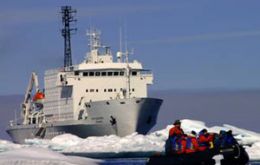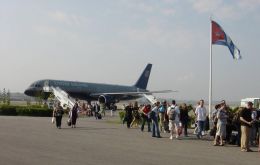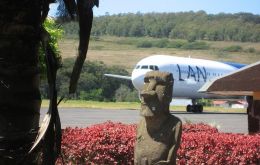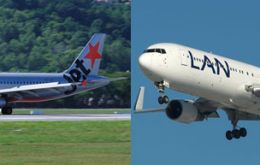MercoPress. South Atlantic News Agency
Tourism
-
Thursday, January 20th 2011 - 16:37 UTC
LAN Chile To Merge With TAM Soon

The Chilean airline Lan announced that it has agreed with the Brazilian airline TAM the terms for the merge of the two airlines, which will take place in the next six to nine months
-
Tuesday, January 18th 2011 - 14:03 UTC
International tourism 2010: multi-speed recovery

International tourism recovered strongly in 2010 according to the advance release of the UN World Tourism Organization (UNWTO) World Tourism Barometer.
-
Tuesday, January 18th 2011 - 07:49 UTC
U.N. Urges Chile to Halt Evictions of Indigenous Protesters

Following months of protests and sit-ins surrounding ancestral land claims on Chile’s Easter Island, the United Nations has officially called on the Chilean government to help diffuse tensions.
-
Tuesday, January 18th 2011 - 01:28 UTC
Cruise news: A new chapter in Antarctic Expedition Cruising

Over the past decade, consumer interest in Antarctica has increased exponentially, with a number of expedition cruise companies operating two- and three-week voyages to the Antarctic Peninsula, the Falklands Islands and South Georgia.
-
Monday, January 17th 2011 - 12:25 UTC
Estancia Vik, Jose Ignacio, Uruguay: The Art of Doing Nothing

Il dolce far niente, (the art of doing nothing), an old Italian expression, so difficult to define with words, becomes crystal-clear once you set foot in Estancia Vik in Jose Ignacio, Uruguay.
-
Monday, January 17th 2011 - 12:16 UTC
Washington makes access to Cuba easier

New guidelines announced Friday by Obama administration making travel and remittance to Cuba easier for US citizens.
-
Friday, January 7th 2011 - 19:36 UTC
LAN launched a new flight between Easter Island and Lima

The first flight of the new route from Lima to Easter Island’s Mataveri airport landed safely this week, making Easter Island a more accessible tourist destination.
-
Thursday, January 6th 2011 - 23:14 UTC
Cuba: Massive cruise liner docks in La Havanna to much fanfare

A salsa band, dancing schoolchildren and showgirls in bikini tops and feather headdresses welcomed some 1,500 tourists on a British cruise liner that officials described as among the biggest ships to visit Cuba in years.
-
Thursday, January 6th 2011 - 20:58 UTC
Slow Start To Chile’s Tourism Season; fewer Argentines than expected

With its vast array of natural attractions and top-class services, Chile is an attractive tourism destination for Latin Americans, as well as global visitors.
-
Wednesday, January 5th 2011 - 08:55 UTC
New agreement between LAN and Jetstar

Chile's LAN has announced an agreement with the Australian budget airline, Jetstar, owned by Quantas airways.
